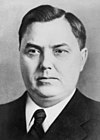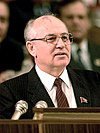List of leaders of the Soviet Union
List of leaders
The following list includes only those persons who were able to gather enough support from the Communist Party of the Soviet Union (CPSU) and the government, or one of these to lead the Soviet Union. † denotes leaders who died in office.
| Name (Birth–Death) |
Portrait | Supreme Rule | Congress | Notes |
|---|---|---|---|---|
| Vladimir Lenin (1870–1924)[1] |

|
30 December 1922[1] ↓ 21 January 1924†[2] |
11th–12th Congress | Chairman of the Council of People's Commissars (Sovnarkom) and informal leader of the Bolsheviks since their inception.[1] Was leader of the Russian Soviet Federative Socialist Republic (RSFSR) from 1917 and leader of the Union of Soviet Socialist Republics (USSR) from 1922 until his death.[3] |
| Joseph Stalin (1878–1953)[2] |
File:Stalin lg zlx1.jpg | 21 January 1924[2] ↓ 5 March 1953†[4] |
13th–19th Congress | General Secretary from 3 April 1922 until 1934, when he resigned from office; the post of General Secretary itself was abolished in October 1952.[5] Stalin served as Premier from 6 May 1941 until his death on 5 March 1953.[4] He also held the post of the Minister of Defence from 19 July 1941 until 3 March 1947 and Chairman of the State Defense Committee during the Great Patriotic War[6] and became the only officer to hold the office of People's Commissariat of Nationalities from 1921–1923.[7] |
| Georgy Malenkov (1902–1988)[8] |

|
5 March 1953[8][9] ↓ 8 February 1955[10] |
19th Congress | Succeeded to all of Stalin's titles, but was forced to resign most of them within a month.[11] Malenkov, through the office of Premier, was locked in a power struggle against Khrushchev.[12] |
| Nikita Khrushchev (1894–1971)[13] |

|
8 February 1955[13] ↓ 14 October 1964[14] |
20th–22nd Congress | Served as the First Secretary of the Central Committee of the Communist Party of Soviet Union (from September 1953) and Chairman of the Council of Ministers from 27 March 1958 to 14 October 1964. While vacationing in Abkhazia, Khrushchev was called by Leonid Brezhnev to return to Moscow for a special meeting of the Presidium, to be held on 13 October 1964. There, at the most fiery session since the so-called "anti-party group" crisis of 1957, he was fired from all his posts and became a "non-person".[15] |
| Leonid Brezhnev (1906–1982)[14] |
A man with dark, wavy hair in a suit, applauding | 14 October 1964[14] ↓ 10 November 1982†[16] |
23rd–26th Congress | Served as First Secretary of the Central Committee of the Communist Party, was later renamed General Secretary,[17] and was co-equal with premier Alexei Kosygin until the 1970s. To consolidate his power he later assumed the title of Chairman of the Presidium.[18] |
| Yuri Andropov (1914–1984)[19] |
A man in a suit wearing glasses | 12 November 1982[19] ↓ 9 February 1984†[20] |
— | General Secretary of the Central Committee of the Communist Party[21] and Chairman of the Presidium from 16 June 1983 until 9 February 1984.[22] |
| Konstantin Chernenko (1911–1985)[23] |
File:Konstantin Chernenko.jpg | 13 February 1984[23] ↓ 10 March 1985†[17] |
— | General Secretary of the Central Committee of the Communist Party[24] and Chairman of the Presidium from 11 April 1984 to 10 March 1985.[25] |
| Mikhail Gorbachev (1931–)[26] |

|
11 March 1985[17] ↓ 19 August 1991[27] |
27th–28th Congress | Served as General Secretary from 11 March 1985,[25] and resigned on 24 August 1991,[28] Chairman of the Presidium of the Supreme Soviet from 1 October[24] 1988 until the office was renamed to the Chairman of the Supreme Soviet on 25 May 1989 to 15 March 1990[25] and President of the Soviet Union from 15 March 1990[29] to 25 December 1991.[30] The day following Gorbachev's resignation as President, the Soviet Union was formally dissolved.[27] |
| Gennady Yanayev (1937–2010) (usurper) |
19 August 1991 ↓ 21 August 1991 |
— | He took power during the 1991 Soviet coup d'état attempt with the State Committee on the State of Emergency. | |
| Mikhail Gorbachev (1931–)[26] |

|
11 March 1985[17] ↓ 19 August 1991[27] |
27th–28th Congress |
- ^ a b c Brown 2009, p. 53.
- ^ a b c Brown 2009, p. 59.
- ^ Sakwa 1999, pp. 140–143.
- ^ a b Service 2009, p. 323.
- ^ Service 1986, pp. 231–32.
- ^ Green & Reeves 1993, p. 196.
- ^ Service 2005, p. 154.
- ^ a b Service 2009, p. 331.
- ^ Service & 2009 332.
- ^ Duiker & Spielvogel 2006, p. 572.
- ^ Cook 2001, p. 163.
- ^ Hill 1993, p. 61.
- ^ a b Taubman 2003, p. 258.
- ^ a b c Service 2009, p. 377.
- ^ Service 2009, p. 376.
- ^ Service 2009, p. 426.
- ^ a b c d e Service 2009, p. 378.
- ^ Brown 2009, p. 402.
- ^ a b Service 2009, p. 428.
- ^ Service 2009, p. 433.
- ^ Brown 2009, p. 403.
- ^ Paxton 2004, p. 234.
- ^ a b Service 2009, p. 434.
- ^ a b Europa Publications Limited 2004, p. 302.
- ^ a b c Paxton & 2004 235.
- ^ a b Service 2009, p. 435.
- ^ a b c d Gorbachev 1996, p. 771.
- ^ Service 2009, p. 503.
- ^ Paxton 2004, p. 236.
- ^ Paxton 2004, p. 237.
